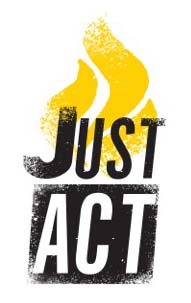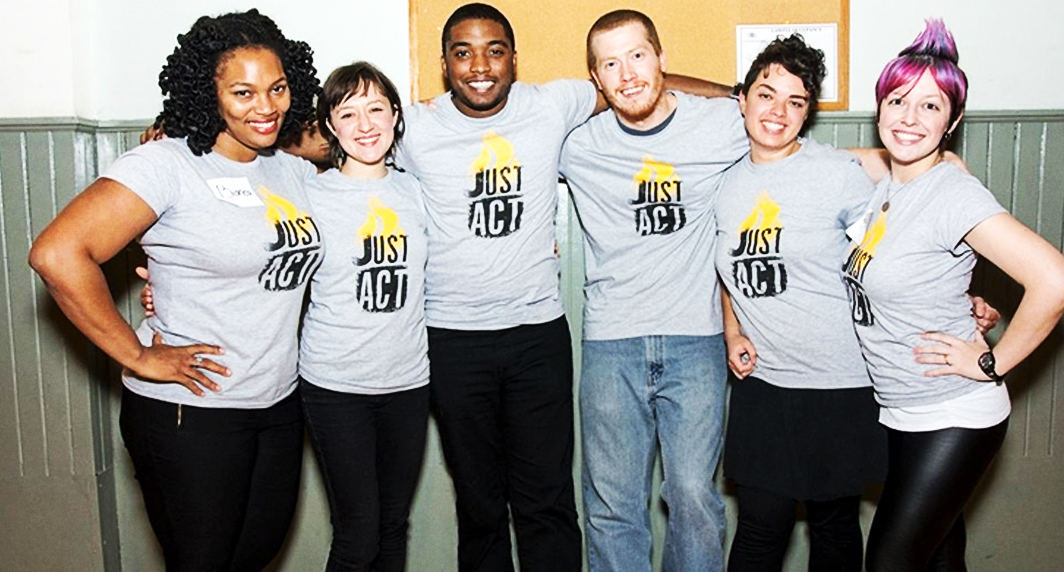A black man driving through a Philadelphia suburb is harassed by the cops. A Jewish man at work experiences a haunting bout of discrimination. A black woman is discounted and disrespected by a white male colleague in the office.
These are the stories of Philadelphians, strangers to each other, but not to the ideas that stalk so much of Philadelphia life: Discrimination. Misunderstanding. Miscommunication.
It’s these ideas—and the real people affected by them—that Mt. Airy theater troupe Just Act explores through experiential events, like its launch performance in December, in which audience members became spect-actors to flesh out solutions to the most important issues of our time and place. The company’s method involves improvisational problem solving; its ultimate goal is to generate social change.
“We’re working for all of us today for a better, more equitable tomorrow,” says Lisa Jo Epstein, Just Act’s founder and executive director. “We really want to stimulate the insides of the spect-actors to want to take action on what they are seeing in front of them. And it always works.”
This evening, Just Act is one of several organizations around the country hosting a People’s State of the Union, in which participants can share whatever stories about their lives they think the next President of the United States should hear. The stories will be performed, recorded and sent to the United States Department of Arts and Culture. With the help of commissioned writers, the USDAC will then string together the anecdotal array into a Poetic Address to the Nation, a live performance in which a new collaborative poem is presented each year. (Last year was the PSOTU.)
“Your story becomes a part of a collective story that will be heard all over the country,” says Bianca Adger, a member of the Just Act ensemble. “That’s cool to be a part of.”
Just Act follows a technique known as “Theatre of the Oppressed,” which requires participants to play themselves, rather than fictional characters. For example, Adger, an African American woman, must consider the roles her race and gender play in each Theatre of the Oppressed performance.
“When you play a character that’s African American like you, and they may be going through the same struggles as you experienced, it becomes harder,” Adger says, “because you have to tap into your own emotions and feelings on the topic.”
Epstein, who has taught theatre at universities in the United States and France, first fell in love with Theatre of the Oppressed in 1990, when she learned about the form from a colleague, with whom she started using it as a teaching tool. Soon after, she met its original creator, Augusto Boal, now globally recognized in the world of theater. Epstein studied alongside Boal in Paris for three years, exploring French social issues and how they can be solved through theater.
A Philadelphia native, she returned to the United States to work on the societal problems in her home country. After giving up a tenured teaching job at Tulane University in 2005, she returned to the Philadelphia area, and founded Gas & Electric Arts with her husband, utilizing Theatre of the Oppressed to work with communities in Philadelphia and Chester, PA.
“We’re working for all of us today for a better, more equitable tomorrow,” says Lisa Jo Epstein, Just Act’s founder and executive director. “We really want to stimulate the insides of the spect-actors to want to take action on what they are seeing in front of them. And it always works.”
In December, Just Act debuted its distinctive style, combining Theater of the Oppressed with techniques derived from John O’Neal, a member of the Free Southern Theater, a cultural branch of the Student Non-Violent Coordinating Committee, which used the techniques to advocate for Civil Rights in the 1960s.
First, they assembled audience members into story circles. Each member shared a two-minute story of conflict with the small group, then one member from each circle redelivered a story to the full room of more than 100 people.

Finally, participants voted for a single story they wanted Just Act to perform, one deemed both powerful and relatable. In this case, it was an African American woman’s retelling of a conflict she had experienced at work.
Just Act members reenacted the scene with Tyler Brelje, a white man, as the combative colleague, and Adger as the black woman. Epstein acted as a facilitator—known as a “joker” in Theatre of the Oppressed terminology—by asking audience members how they wanted to change the plotline. One by one, spect-actors stepped in to handle the conflict in different ways in an attempt to resolve the problem.
Just Act is one of several organizations around the country hosting a People’s State of the Union, in which participants can share whatever stories about their lives they think the next President of the United States should hear.
“It lets us see that we don’t have to go to our first response,” Adger says. “We can breathe in the moment, and figure out other ways to deal with the conflict that is presented before us.”
This problem solving technique doesn’t just make for more interesting performances. Just Act aims to dive into the conflicts that affect the lives of Philadelphia residents—exploring the specific needs of each neighborhood. Through partnering with local civic organizations, the company hopes to start a discussion that will ultimately bring change and improvement to communities. Starting this month, the group is partnering with the Germantown United Community Development Council to assemble a community action and advisory team.
Giving voices to the community residents around the city is a vital part of Just Act’s mission, Epstein says. “My role is not to ever impose what I think the community needs to answer,” Epstein says. “Part of the process is to allow diverse community members to share what they think. This work is a rehearsal for reality.”
Header photo by Darryl Cobb.




